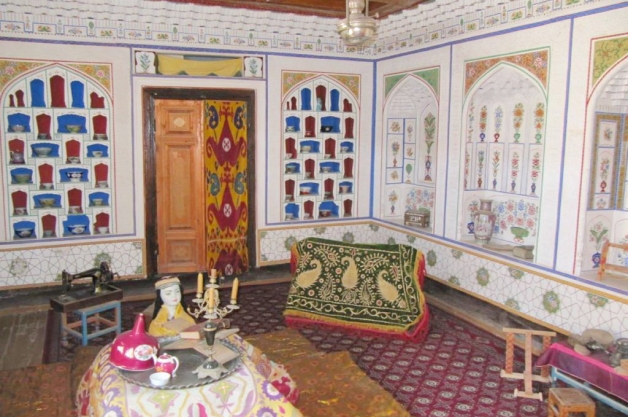Memorial House of Fayzulla Khojaev, Bukhara
The Memorial House of Fayzulla Khojaev in Bukhara is a striking example of nineteenth-century architecture. It is open daily from 09:00 to 17:00 (except Sundays). The Memorial House famous not only because of its owner (a rich merchant) but also because of its magnificent decorations resembling a boutique hotel. Today, this place is very popular among tourists, as it allows you to get acquainted with the history and culture of the late 19-20 centuries, the merchant life of those times, rare pieces of furniture, interiors, and art. Moreover, there is a unique exhibition of "Kitchen in the House of a Rich Merchant".
The location of building is in the center of Bukhara, on 70, A. Tukai Street. The first owner of the house museum was a famous merchant, Ubaydullo Khoja Kasim Khojaev. Then his son Fayzulla Khojaev became the owner of the house. the house was purchased in the late 80s of the 19th century. First, a large plot of land of 3 hectares was purchased. The merchant hoped to accommodate his entire large family here and had several houses built on this territory.
The house is divided into two parts - for men and women. There are also utility rooms, a central living room "mehmonkhona," several smaller living rooms, and balconies. Each room is decorated with carved wood, antiques, exclusive furniture, and rare decorations. Many rooms are adorned with expensive tableware of those times, household items, clothing, painted vases, and many other luxury items.
Ubaydullo Khojaev spent countless funds investing in the upbringing and comprehensive education of his sons-heirs, bringing the best teachers and sending the boys to study in Russia.
Fayzulla Khojaev
His son, Fayzulla Khojaev (1896-1938) did not follow his father's steps and decided to engage in state activities and considerably succeeded in this field becoming a truly outstanding Uzbek politician. After joining the Young Bukharan Party ("Mladobukhartsy") in 1916-1920, he quickly took the role of leader. The historian and poet A. Fitrat became his companion and, after a while, a close friend. Khojaev promoted the ideas of the Jadid movement, fought for the establishment of equal rights, and campaigned against the monarchical regime prevailing in the Bukhara Emirate. He organized a demonstration to support the "Manifesto" of Emir Alim Khan, who proclaimed democratic reforms. Then, he became chairman of the Council of People's Commissars of Uzbek SSR. In 1937, he was arrested by Uzbek SSR People's Commissariat for Internal Affairs (NKVD) on a dubious case. In 1938, he was subjected to capital punishment - execution by shooting with confiscation of personal property. His brother, Aziz-Khan, also fell under repression. In 1965 the name of the Khojaev family was fully rehabilitated, officially recognizing them as victims of the political terror of the USSR.
Nowadays, the house-museum is a model of the prosperity of the Bukhara Emirate. Some exhibits tell about the lives of the elder and the younger Khojaevs. Porcelain dishes, Uzbek musical instruments, and the elegant clothes of Bukharians are especially valuable exhibits. Ethnographic exhibitions showing the magnificent decorations and samples of Bukhara's luxurious life are what make this unique house-museum worth visiting.









